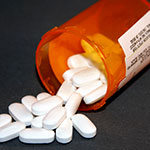This Month’s Contents
- Cognitive Problems in CFS/ME
- Seeking Bedbound Patients
- More Affordable Medications
- Housekeeping Issues
- Emails under the new HIPAA
- Bring your medications to the office with you
Cognitive dysfunction in CFS/ME
 CFS/ME is characterized by four core symptoms: exertional fatigue, muscle pain or headache, sleep disruption or non-restorative sleep, and cognitive dysfunction. Cognitive problems have been cited as one of the most disruptive and functionally disabling symptoms of CFS, with up to 85% of patients reporting impairments. Most affected are attention, concentration, memory, calculation, and processing speed. These lead to problems such as word searching, losing the train of thought, difficulty reading and comprehending, difficulty with mental math (such as making change ), brief periods of confusion or disorientation, and foolish errors, such as putting milk in the closet instead of the refrigerator, or leaving the stove running. Many PWCs find themselves easily distracted, and will go from one task to another, never completing any of them!
CFS/ME is characterized by four core symptoms: exertional fatigue, muscle pain or headache, sleep disruption or non-restorative sleep, and cognitive dysfunction. Cognitive problems have been cited as one of the most disruptive and functionally disabling symptoms of CFS, with up to 85% of patients reporting impairments. Most affected are attention, concentration, memory, calculation, and processing speed. These lead to problems such as word searching, losing the train of thought, difficulty reading and comprehending, difficulty with mental math (such as making change ), brief periods of confusion or disorientation, and foolish errors, such as putting milk in the closet instead of the refrigerator, or leaving the stove running. Many PWCs find themselves easily distracted, and will go from one task to another, never completing any of them!
Testing for cognitive difficulties doesn’t always correlate with person’s day-to-day complaints, however.
First, testing is not very sensitive or specifically directed at CFS-related complaints, so the right tests must be administered in order to get results. Secondly, very intellectual patients show relatively little decline. For example, a person with a very high IQ of 140, say, may drop 30 points to an IQ of 110; however, this is still above average. So the PWC notes a significant decline in ability, but an examiner would testify that this individual should have no problems.
Neuropsychological testing is not the only way to demonstrate cognitive deficits. Cranial MRIs show UBO’s or Unidentified Bright Objects of inflammation in the brains of up to 80% of our PWCs. PWCs with UBOs report being more physically impaired than those patients without brain abnormalities.
SPECT scanning can reveal decreased blood flow in key areas of the brain such as the temporal lobes, amygdala, hippocampus, and midbrain, while PET scanning may display areas of brainstem hypometabolism. Several researchers have shown that cerebral volume is reduced in PWCs with the most severe deficits. Surprisingly, such ‘brain shrinkage’ can be prevented or reversed by physical activity.
Finally, Japanese studies have confirmed that body levels of carnitine or acetyl-carnitine correlate with cognitive deficits. The lower the carnitine, the more cognitive difficulties. Supplementing with carnitine seems to improve thinking, concentration, and memory.
So what can be done to improve cognition? First of all, try to stimulate and exercise your mind. Consider jigsaw and crossword puzzles, word games, card or board games, and computer games. Numerous mind-stimulating websites are available also, such as www.lumosity.com, whose authors have a special interest in CFS/ME.
Certain supplements have shown promise as well, most notably carnitine or acetyl-carnitine at 1000 mg/day. These are available over-the-counter or by prescription. Gingko biloba (over-the-counter) has been touted to increase cerebral blood flow and improve mentation, and many practitioners recommend supplementation with phosphatidyl serine.
Defects in folate and B12 metabolism have been thought to affect brain function, so supplementation with B12 (say, methylcobalamin 1000mcg to 5000mcg daily) and methylfolate (400mcg daily) may be prudent. More potent prescription medications are available such as Deplin ( 15 mg of methylfolate), Metanx ( 3 mg methylfolate / 2 mg B12 / 35mg pyridoxil-5-phosphate), and Cerefolin NAC (methylfolate 5.6mg, B12 2mg, N-acetyl cysteine 600mg).
Recently pharmaceutical companies have been developing products that claim to improve cognition in a wide variety of conditions, including Alzheimer’s Disease. These products include Vayacog (omega-3 fatty acids 26mg + phosphatidyl serine 100mg), Axona (an alternative energy source that the brain can use instead of glucose, 40 gm twice daily), Procera AVH (acetyl-carnitine + vinpocetine+ huperzine), and Prevagen (a jellyfish extract that affects calcium channels). All require prescriptions from your doctor. Unfortunately, we are not aware that any of these have undergone rigorous study in PWCs.
Several Alzheimer’s medications have undergone brief trials in PWCs, including galantamine (Razadyne), donezepil (Aricept), and memantine (Namenda). In brief summary, some PWCs will respond to these medications, but no subset of responders has been identified and most do not respond. In general we do not recommend these medications unless dementia unrelated to CFS/ME is suspected.
Seeking Bedbound Patients
 We are seeking to learn more about PWCs who are severely ill and bedfast. Such individuals are unable to consult with physicians and may not be getting adequate healthcare. Both the Centers for Disease Control and the International Association for CFS/ME and FM (IACFS/FM) are considering programs to identify and assist such patients. If you know such an individual, please email Dr. Lapp (cwlapp@drlapp.net) with the patient’s initials (only) and city of residence. If the person is willing to be contacted, please provide a telephone number and/or email address. Thank you for your help!
We are seeking to learn more about PWCs who are severely ill and bedfast. Such individuals are unable to consult with physicians and may not be getting adequate healthcare. Both the Centers for Disease Control and the International Association for CFS/ME and FM (IACFS/FM) are considering programs to identify and assist such patients. If you know such an individual, please email Dr. Lapp (cwlapp@drlapp.net) with the patient’s initials (only) and city of residence. If the person is willing to be contacted, please provide a telephone number and/or email address. Thank you for your help!
More Affordable Medications
The cost of medication seems to be rising every day. While we strive to prescribe medications that are both low in cost and effective, sometimes you end up paying high prices due to higher Tier levels, quantity limitations, the donut hole, etc.
If you are not on Medicare or Medicaid, many pharmaceutical houses will provide generous allowances just by going to their website and downloading a coupon.
For those in need with a household income at or below 300% of the federal poverty level, over 500 medications are available from Rx Outreach for $30 or less for a 180-day supply. This requires only a one page application and a valid prescription. Check them out at www.RxOutreach.org , or 855-796-4968.
It pays to shop around for the best price if you are paying cash for your medications. Wal-Mart, Target, and many larger grocery store pharmacies offer generics at about $4 for a month’s supply, or $10 for a 3-month supply. Sam’s Club and Costco usually offer very low prices also, and you do not need to be a member to use the pharmacy services.
More and more of our friends are ordering their medications (for individual private use) from Canada. We have had good success with Clayman Pharmacy (877 735 7271), Jans Drugs (jandrugs.com), and Canada Drugs (www.canadadrugs.com); for more choices see the Consumer Reports summary at: http://www.pharmacychecker.com/onlinepharmacyratings.asp
Housekeeping Issues
Encrypted emails: as of September 2013, new and stricter HIPAA regulations have begun. We are no longer allowed to answer emails directly if they include any hint about your case (or Protected Health Information). Therefore, most emails that you receive from Hunter-Hopkins will have to be retrieved from an encrypted email site. You may send an email to us directly, or send it via our encrypted site at https://securecontact.me/cwlapp@drlapp.net.
 Bring medications bottles with you: We have noticed some discrepancies in medication doses that we have on file compared to what patients are actually taking. The best way to avoid such inconsistencies is to bring your medication bottles with you to each office appointment so that we can check the accuracy.
Bring medications bottles with you: We have noticed some discrepancies in medication doses that we have on file compared to what patients are actually taking. The best way to avoid such inconsistencies is to bring your medication bottles with you to each office appointment so that we can check the accuracy.
Confirm appointments: be sure to confirm your appointment when you receive that reminder call from Pam or one of the other HHC staff members. Because appointment time is so valued, it is our policy to cancel an appointment and reschedule someone else if we have not heard back from you within 24 hours of your appointment.
This ME Letter is published periodically by Hunter-Hopkins Center, P.A., 7421 Carmel Executive Park, Suite 320, Charlotte, North Carolina 28226, USA. Telephone (704) 543 9692, Fax (704) 543 8547.
Our organization partnered with Needy Meds for low cost medications. Check it out: http://pandoraorg.net/Low-cost_Medication.html
Your article on brain function is very interesting. As a cfs sufferer I too find it hard to process everything and concentrate. And get very upset or frustrated at doing so. Your work is invaluble, thank you for helping us.